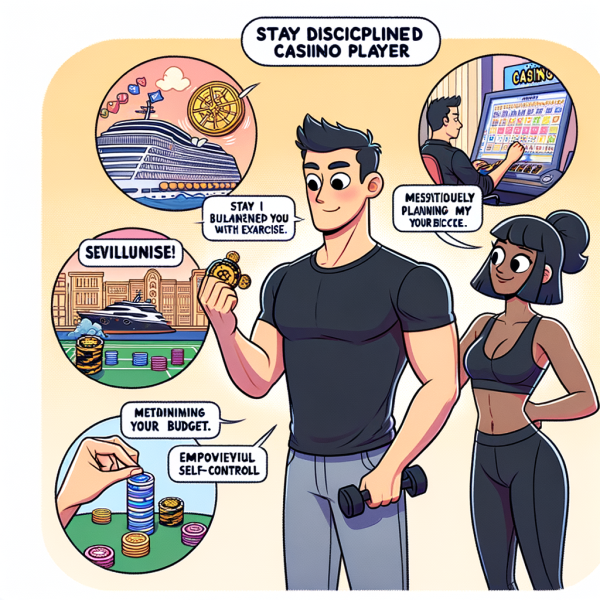Understanding Gambling: A Double-Edged Sword in Lifestyle Choices
Gambling is often viewed through a polarized lens, with opinions ranging from it being a harmless pastime to a gateway to addiction. In popular culture, it is frequently glamorized, depicted as an exhilarating activity that can lead to instant wealth. However, beneath this surface lies a complex reality where the potential for financial ruin and psychological distress looms large. Understanding gambling’s multifaceted nature is crucial for evaluating whether it can coexist with a healthy lifestyle.
The duality of gambling can be likened to a double-edged sword; it offers excitement and social interaction but also presents significant risks. Some individuals engage in gambling as a form of entertainment, experiencing the thrill of chance without losing control. For others, the lure of big wins can lead to compulsive behaviors, often resulting in detrimental impacts on personal relationships, finances, and mental health. This dichotomy emphasizes the importance of personal accountability and awareness in gambling behaviors.
Moreover, gambling is influenced by societal norms and regulations. In many cultures, it is acceptable and even celebrated, while in others, it is stigmatized. The context in which gambling occurs can heavily influence individuals’ perceptions and behaviors, potentially leading to varying degrees of risk and reward. To ascertain whether gambling can fit into a healthy lifestyle, it is essential to dissect both its positive and negative aspects.
Finally, acknowledging the legal and ethical implications surrounding gambling is vital. With an array of options available—from casinos and online platforms to lottery tickets—gamblers must navigate a landscape fraught with varying degrees of risk. Understanding these dimensions will aid in forming a more nuanced perspective on gambling as a potential component of a balanced lifestyle.
The Psychology of Gambling: Risks and Rewards Explained
The psychology of gambling is intricate, intertwining elements of chance, reward anticipation, and emotional responses. At its core, gambling operates on a reward system that feeds into the brain’s pleasure centers. When individuals win, they experience a rush of dopamine, reinforcing the behavior and often leading to a desire to gamble more. This mechanism can create a cycle of dependency, where the thrill of victory overshadows the potential for loss.
Conversely, the psychological allure of gambling also stems from its perceived social benefits. Many individuals view it as a bonding experience, sharing thrills with friends or family during game nights or outings to the casino. This social aspect can contribute positively to mental well-being by fostering connections and creating shared experiences. However, it is essential to recognize the thin line between enjoyment and obsession.
Furthermore, the concept of risk tolerance plays a significant role in gambling psychology. Some individuals may have a higher threshold for acceptable losses, engaging in gambling as a calculated risk similar to other investments. Others, conversely, may find themselves spiraling into addiction after just a few losses. Understanding one’s psychological predisposition to gambling can help to mitigate risks and manage behaviors effectively.
Lastly, awareness of gambling-related cognitive distortions—such as the illusion of control or gambler’s fallacy—can enhance personal accountability. Recognizing these mental traps, gamblers can make more informed choices, ultimately leading to healthier engagement with gambling activities.
Healthy Boundaries: Defining Responsible Gambling Practices
Establishing healthy boundaries is paramount for individuals who choose to engage in gambling as part of their lifestyle. Responsible gambling practices go beyond simply setting monetary limits; they encompass a holistic approach to ensure that gambling remains a source of entertainment rather than a source of stress or harm.
One of the most effective methods for promoting responsible gambling is the implementation of self-exclusion strategies. Gamblers can voluntarily restrict their access to gambling venues or platforms for specified periods. This proactive approach can serve as a safeguard against developing unhealthy habits, particularly for those who may struggle with impulse control.
Another critical component of responsible gambling is education. Understanding the odds of games, the nature of losses, and the psychological tricks that gambling venues often employ can empower individuals to make informed choices. Many organizations offer resources and tools designed to educate gamblers about safe practices, including budgeting for entertainment expenses and recognizing signs of problem gambling.
Creating a support system can also play a crucial role in establishing healthy boundaries. Friends and family can help keep each other accountable, providing an additional layer of oversight. By fostering open conversations about gambling habits, individuals can receive constructive feedback and guidance, promoting a healthier relationship with gambling.
| Responsible Gambling Practices | Description |
|---|---|
| Set Financial Limits | Determine an amount you can afford to lose. |
| Time Management | Allocate specific time for gambling activities. |
| Self-Exclusion | Use tools to restrict access to gambling sites. |
| Seek Support | Involve friends or family in your gambling decisions. |
Social Aspects of Gambling: Community and Connection Benefits
While gambling often garners negative attention due to its potential for addiction and financial impairment, it also has meaningful social aspects that can contribute positively to an individual’s well-being. Social gambling can foster a sense of community, creating opportunities for bonding and shared experiences among participants.
Game nights with friends or family can serve as an engaging form of entertainment, allowing individuals to connect in a relaxed setting. The thrill of competition and the shared excitement of wins or losses can enhance relationships and provide a sense of belonging. In this respect, gambling becomes more than a game of chance; it transforms into a social activity that promotes camaraderie and interaction.
Moreover, many gambling establishments host events or tournaments, encouraging community involvement and engagement. Such gatherings can elevate the social experience, providing an opportunity to meet new people and form friendships based on shared interests. This aspect of gambling can be particularly beneficial for those seeking social interactions, as it offers an alternative avenue for connection outside traditional social settings.
Nevertheless, it is essential to maintain a balanced perspective on the social aspects of gambling. While the sense of community can enrich lives, it should not overshadow the need for responsible behavior. Awareness of gambling’s potential downsides is crucial to ensuring that the social benefits do not lead to harmful consequences.
The Role of Moderation: Balancing Fun and Risk in Gambling
Moderation is the cornerstone of incorporating gambling into a healthy lifestyle. Like many leisure activities, gambling can be enjoyable and fulfilling when approached with a balanced mindset. Setting clear expectations and boundaries is essential for ensuring that gambling remains a form of entertainment rather than a source of stress.
To foster moderation, individuals should consciously allocate a specific portion of their budget for gambling activities. By treating gambling as a form of entertainment akin to dining out or attending a concert, individuals can compartmentalize their spending and avoid the pitfalls of impulsive decisions. This financial planning can help mitigate the risks associated with gambling.
Additionally, understanding one’s emotional triggers is vital for maintaining moderation. Recognizing when to step back—such as during periods of stress or emotional highs—can be instrumental in preventing excessive gambling. Developing self-awareness and emotional regulation strategies can empower individuals to make healthier choices.
Ultimately, the key to balancing fun and risk in gambling lies in introspection and self-regulation. By being mindful of personal limits and maintaining a healthy perspective on gambling, individuals can enjoy its social and entertainment value without the adverse consequences that often accompany excessive participation.
Conclusion: Can Gambling Fit into a Holistic Healthy Lifestyle?
In summary, the question of whether gambling can fit into a holistic healthy lifestyle is complex and multifaceted. While the potential for addiction and financial ruin exists, responsible gambling practices, social benefits, and moderation can create a framework within which gambling can be enjoyed as a legitimate leisure activity.
The crux of the matter lies in individual accountability and self-awareness. By understanding the psychological aspects of gambling and establishing healthy boundaries, individuals can navigate their gambling experiences in a way that enhances their lives rather than detracts from it.
Community engagement through social gambling can also provide meaningful connections, enriching the overall experience. Therefore, the potential for gambling to coexist with a healthy lifestyle is not only feasible but can also be rewarding when approached with care and thoughtfulness.
In conclusion, while gambling is not inherently a component of a healthy lifestyle, it can be integrated responsibly. As long as individuals maintain awareness of their behaviors and establish healthy practices, gambling can indeed be a part of a balanced life.
Q&A Section
Q: Can gambling be considered a hobby?
A: Yes, when engaged in responsibly and in moderation, gambling can be regarded as a hobby, similar to other leisure activities.
Q: What are the signs of problem gambling?
A: Signs include gambling more than planned, neglecting responsibilities, and feeling anxious or irritable when not gambling.
Q: How can I set limits for gambling?
A: To set limits, determine a budget for gambling activities and stick to it. Use self-exclusion tools if necessary.
Q: Is there help available for those struggling with gambling?
A: Yes, there are numerous resources, including hotlines and support groups, designed to assist individuals facing gambling-related issues.




